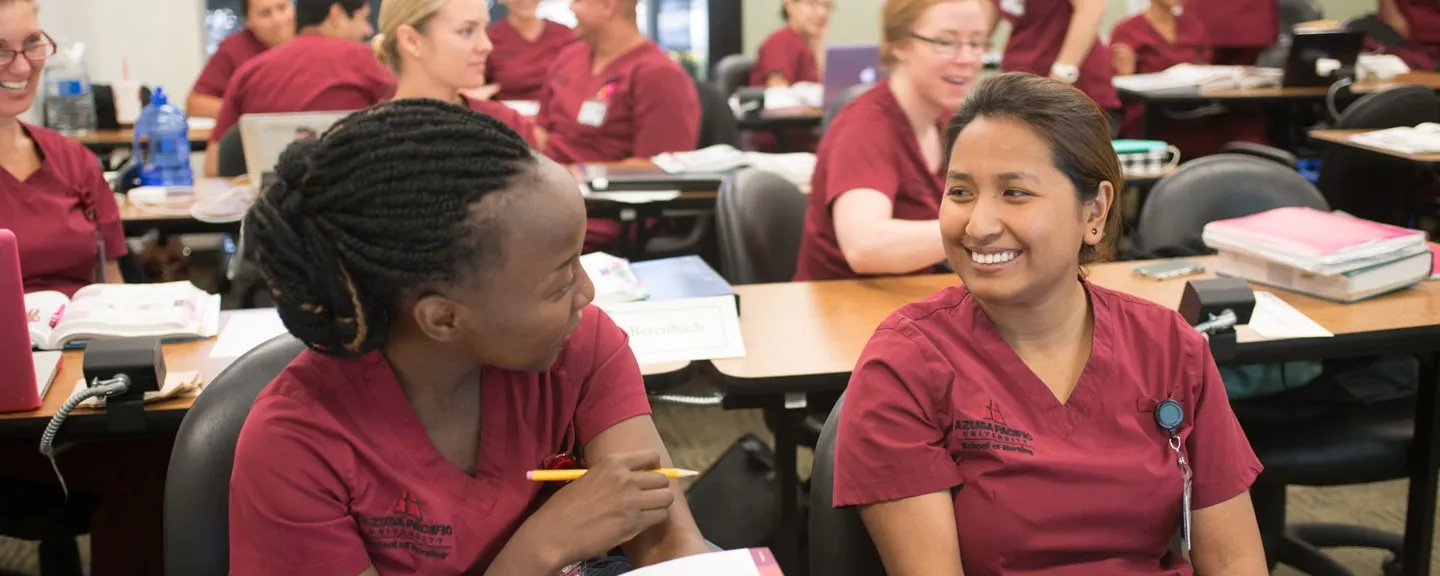- Home
- >
- APU Articles
- >
- News Article
Nursing Student Tips for Balancing School and Life
May 21, 2019 | Written By Heather Nelson

Though no one claims the road to a nursing degree is easy, it’s incredibly rewarding—and there are many different ways nursing students can set themselves up for success. It just takes a little planning, a solid support network of faculty and friends, and a lot of self-care. Here are four tips to help you balance it all.
1. Master Time Management
If nursing students want to be successful, they must learn to manage their time. Making an effort to master time management at the start of nursing school is key to keeping yourself on track.
At the start of each semester, use a planner or other tool to map out your class schedule, as well as the key dates for presentations, tests, papers, and clinicals. Give yourself enough time to complete your workload for each task, and check in with yourself each week to see if any adjustments are needed.
2. Be Proactive
There’s a lot to accomplish as a nursing student, and it can all start to feel overwhelming at times. While avoiding responsibilities until the last minute and trying to “go with the flow” might be tempting, this can lead to higher feelings of stress when you’re rushing to complete an assignment.
To help avoid procrastination, to-do lists should become your best friend. Making these lists is a great way to organize and prioritize what needs to get done on a daily basis, and they act as a perfect reminder to set goals, to establish deadlines, and most importantly, to be proactive.
3. Meet with an Advisor
Nursing students don’t have to wade through a heavy course load on their own. There are always people willing to help you succeed.
Take time to meet with a faculty advisor at the start of each semester to go over your courses, chart your progression, and discuss personal situations that might affect your studies. Then, seek their advice on how to be successful that semester (and down the road).
4. Make Time for Self-Care
If you want to take care of others, you must first be able to take care of yourself. Nurses spend long hours providing care to their patients, often to their own detriment. Combating this habit as a nursing student not only helps you work through nursing school in a healthy way—it prepares you to do the same once you start your career.
“We will be able to care for others more effectively when we learn to care for ourselves as well,” said Elizabeth Lopez, PhD, RN, FNP-C, an assistant professor at the Azusa Pacific University School of Nursing. “As nurses, we advocate the importance of providing holistic care to our patients. Therefore, we should also advocate that for ourselves.”
Lopez emphasized the importance of students’ holistic well-being. “At APU, we faculty [members] care about the physical, emotional, and spiritual well-being of nursing students.”
For physical well-being, try finding an activity you enjoy and dedicate some time to it a few times a week. This might include hiking, swimming, an exercise class, or just heading out for a run.
When it comes to emotional well-being, Lopez recommended taking breaks between studying to connect with friends and family. Grab a coffee. Sit down and enjoy lunch. Or just take a few minutes to chat on the phone.
Spiritually, Lopez suggested students spend some time alone in prayer or meditation on a daily basis. Read scripture that encourages you. Head to church to sing or serve those in need. Taking time to fill yourself spiritually can help you charge back into the nursing student workload.
Preparing for Success
Above all else, it’s important to remember that you have a community around you that wants you to succeed. Becoming a nurse is hard work; there’s no getting around that. It can be overwhelming, challenging, and stressful. But it’s these challenges that help you learn to balance, prioritize, and problem-solve, so you can go on to provide high-quality health care to your community—and beyond.
Are you interested in starting a career in nursing? Azusa Pacific University’s nursing major equips students to provide effective, compassionate health care.